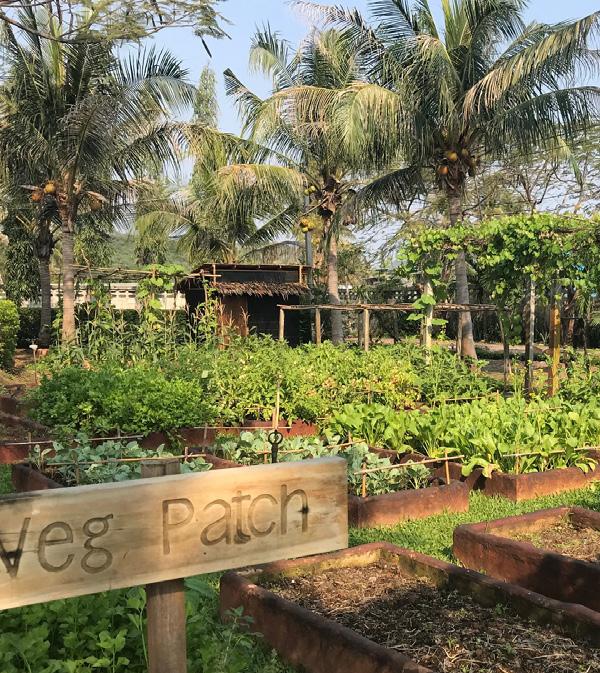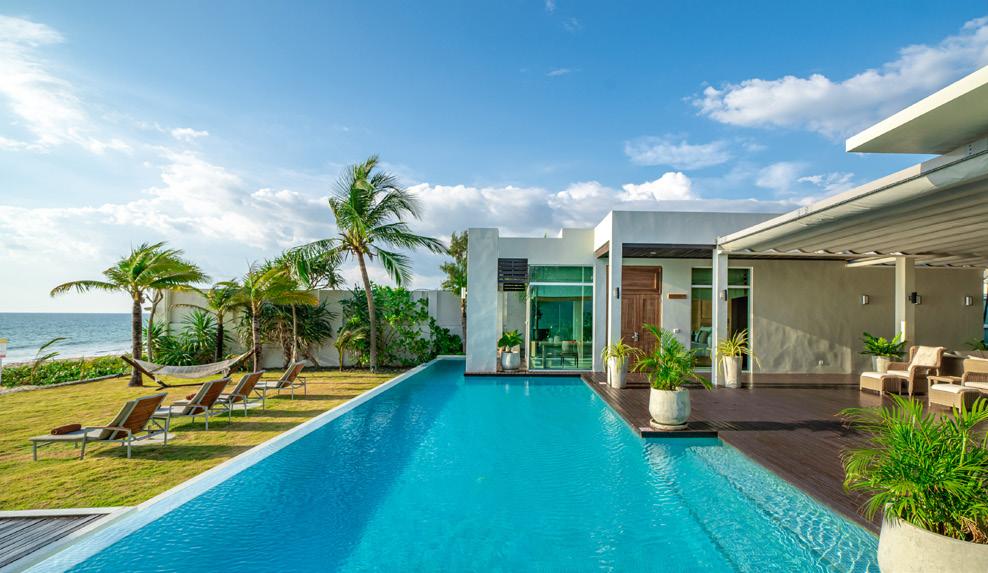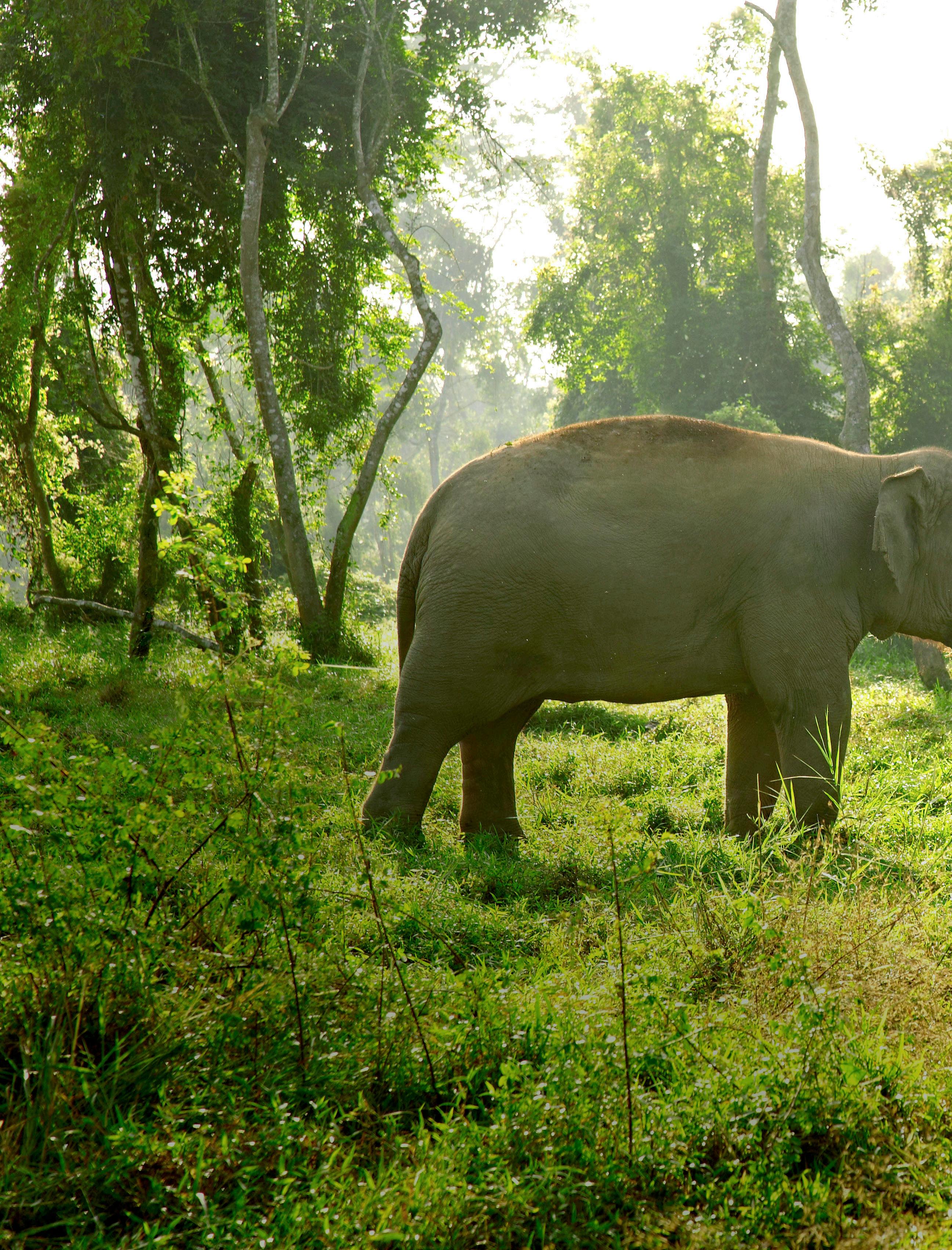
9 minute read
ONE GIANT EFFORT
#CONSERVATION #ELEPHANTS One giant effort
Conservation projects centred around Thailand’s endangered wildlife and its 3,800 captive elephants are also providing incredible opportunities for tourists. By Julie Miller
Advertisement
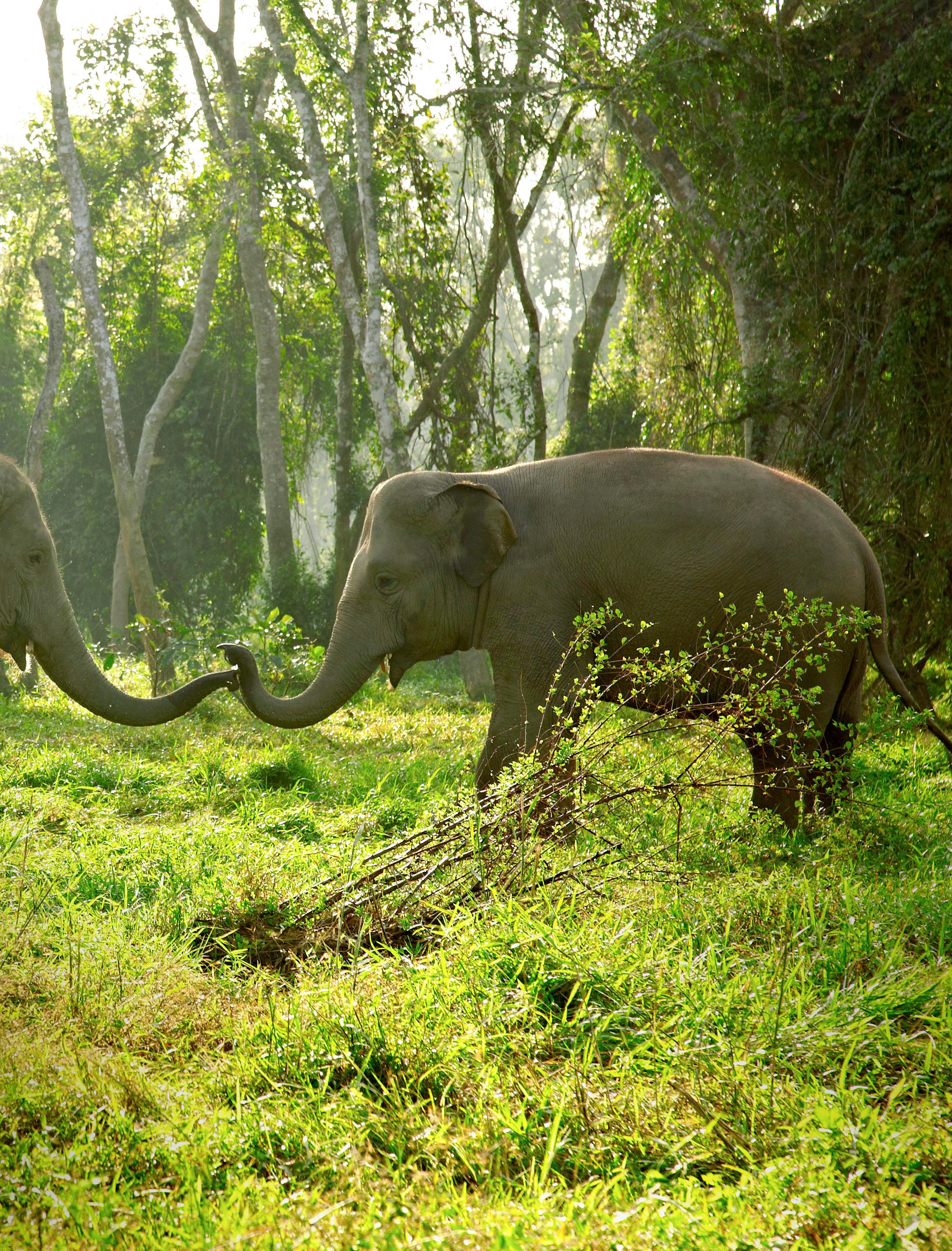
F
OR MANY DECADES, Thailand’s unique relationship with the Asian elephant has been a cornerstone of its tourism industry, with visitors to the ‘Land of Smiles’ always keen for an encounter with one of its gentle giants. Recently, animal welfare concerns have led to a more ‘handsoff’ approach, with elephant riding largely replaced with the joy of simply watching pachyderms at play in their natural habitat. Today, there are thankfully many ethical elephant sanctuaries where the wellbeing of the animal is paramount, resulting in a happier experience for both the eles and their admirers.
While the quiet times enforced by COVID-19 clearly impacted conservation efforts reliant on international tourism, one of Thailand’s highest-profile elephant camps – the Golden Triangle Asian Elephant Foundation (GTAEF) at the Anantara Golden Triangle Elephant Camp & Resort – found an unexpected silver lining in the lack of visitors.
“As we weren’t having to concentrate on guests, we started to notice little things about the elephants and learned more about elephant relationships than we had in the past,” says John Roberts, director of elephants for GTAEF. “We now bond the elephants into ‘friendship groups’... if the elephants get along, it’s a much more relaxed situation, and the mahouts (handlers) don’t have to control them so much. That way, we can genuinely see them interacting and wandering through the forest.”
The resort’s lush elephant camp is home to more than 20 pachyderms and their mahout families, rescued from a life of street begging, the logging industry or a harsh existence working in trekking camps. As well as a ‘no ride’ policy, the camp also discourages guests from feeding the elephants. Instead, individual guest experiences include ‘Walking with Giants’ (trekking through the forest with bonded elephants) and ‘Elephant Guardian’ (learning about the traditional mahout lifestyle.)
For an immersive experience, an overnight stay in one of the resort’s Jungle Bubbles is a must. There are currently two of the transparent sleeping domes (with another family suite in the works), both of which allow a 360-degree view of a jungle enclosure where elephants roam at night.
“The Jungle Bubbles [are] a really cool experience, where you are able to see the elephants in their friendship groups at night, hanging around in an enclosed area,” enthuses Roberts. “You wake up at three in the morning when an elephant breaks a branch, you go outside and, if there’s any moonlight, you can see one munching away. It’s a magnificent experience.”
As well as protecting the 20-plus elephants in its northern Thailand camp, GTAEF also supports elephant research projects, subsidises 14 specialist vets and funds a mobile clinic in Ban Ta Klang, home to more than 400 ‘unemployed’ elephants and their mahout carers. The team also supports a conservation project working with wild elephants in Khao Yai National Park. For more information about its work, visit helpingelephants.org.
OPENING SPREAD: Elephants in their natural habitat at the Anantara Golden Triangle Elephant Camp & Resort © Markus Gortz OPPOSITE: GTAEF director, John Roberts © James de la Cloche
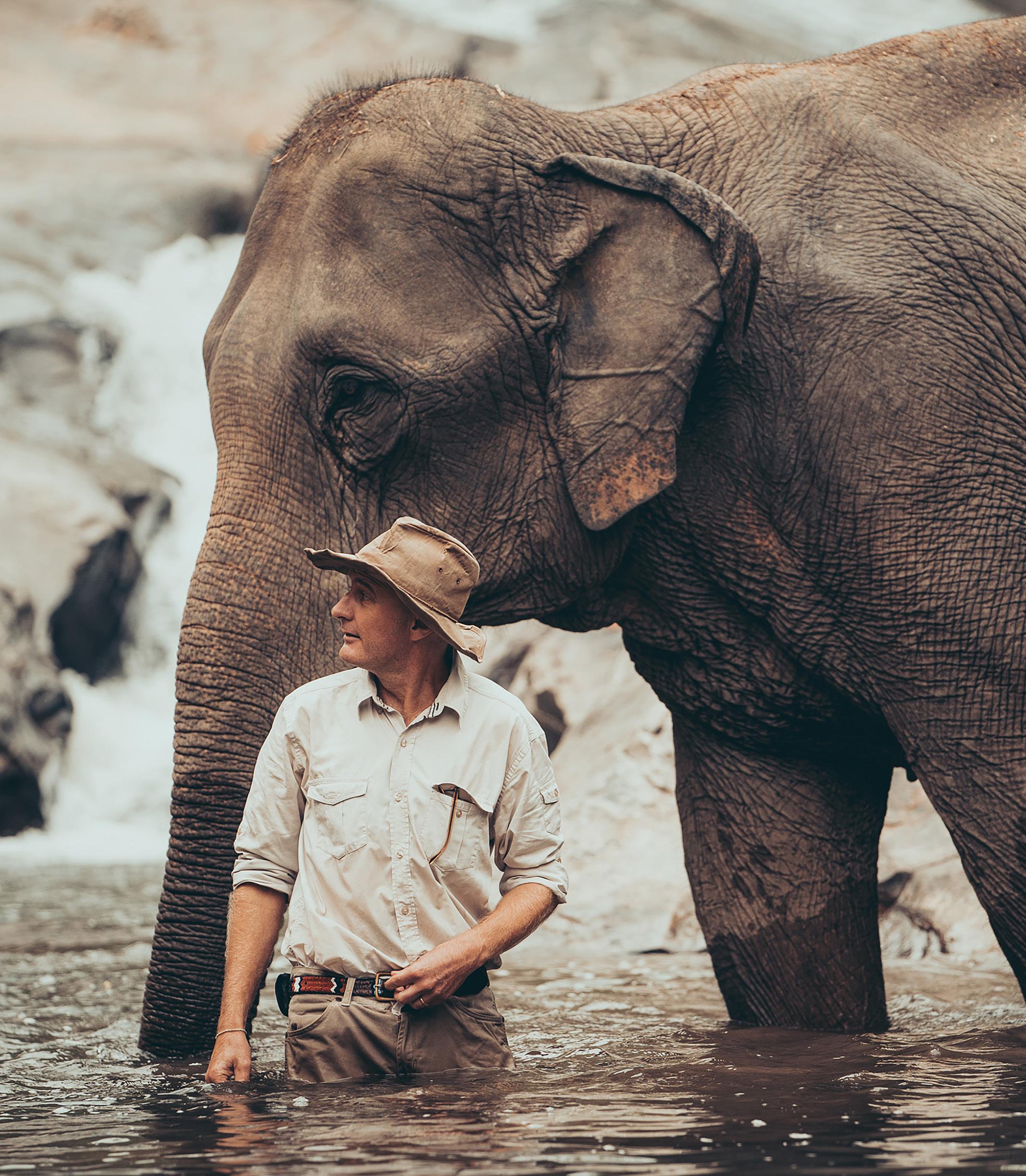
#WILDLIFE Wild about Thailand#SANCTUARY
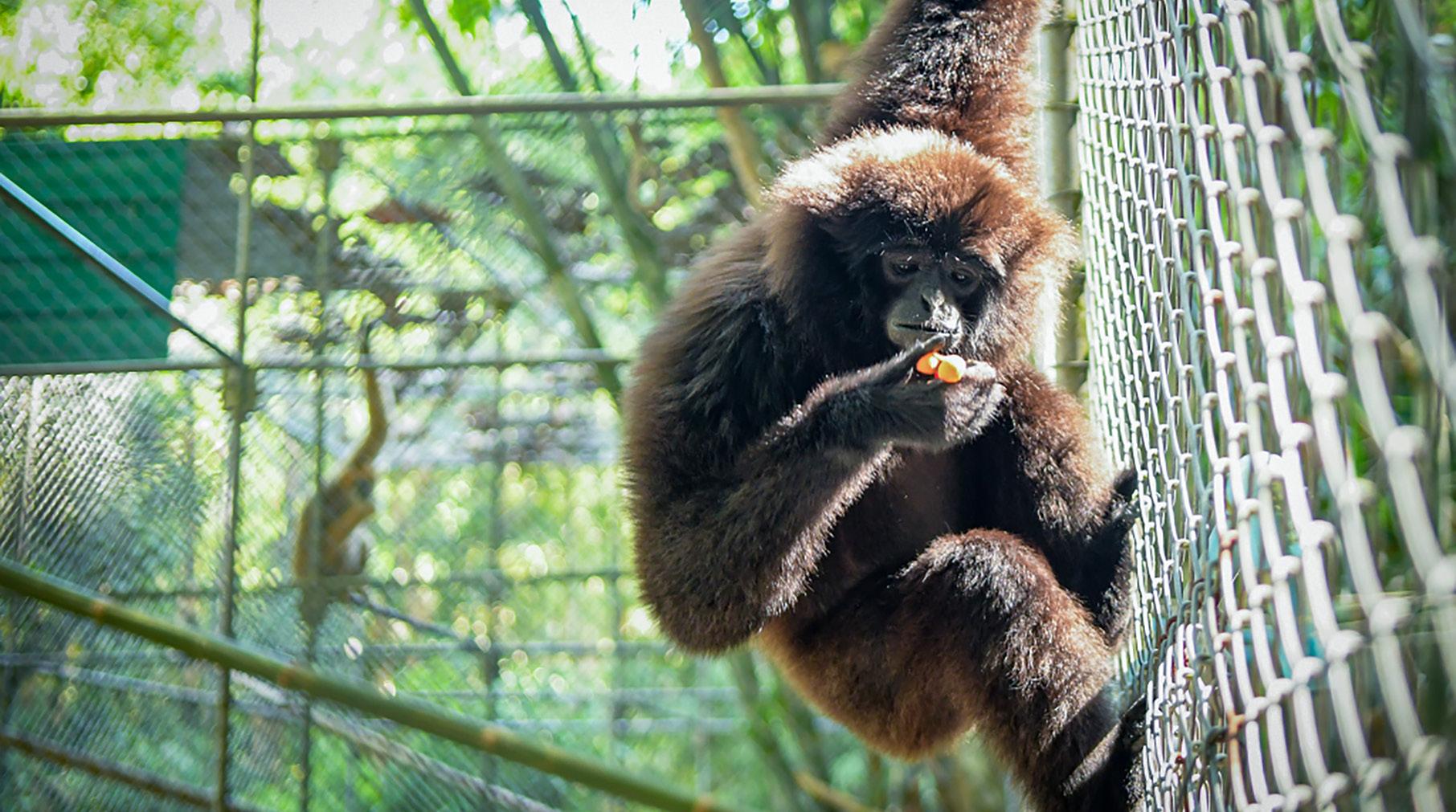
Here are seven great wildlife sanctuaries that welcome visitors and volunteers, where you can learn more about Thailand’s conservation efforts. By Julie Miller
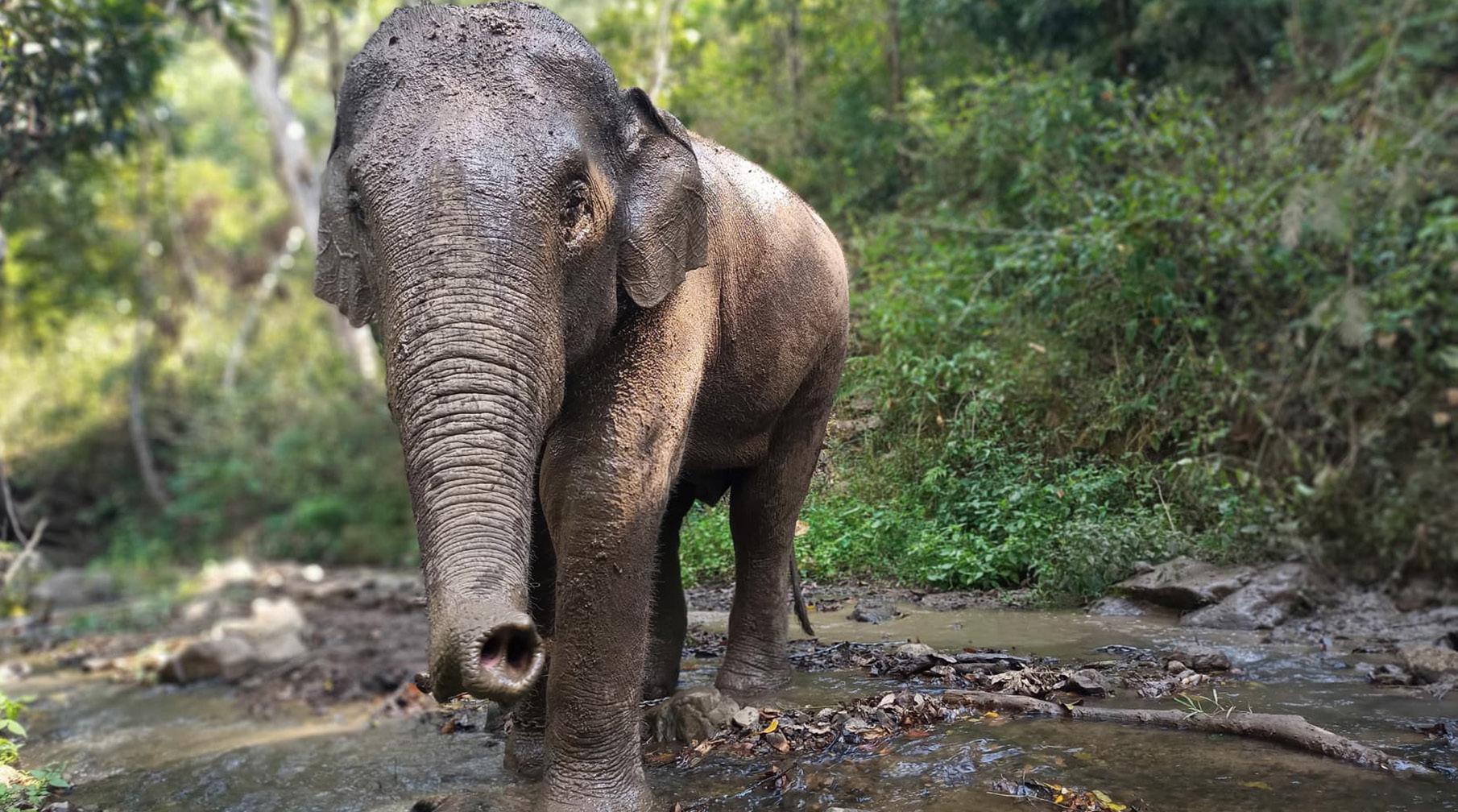
CHAI LAI ORCHID RESORT This beautiful communitybased resort in the mountains of Mae Wang near Chiang Mai features thatched bungalows surrounded by pristine elephant habitat. Ethical elephant experiences include jungle treks to Karen villages, learning to communicate with elephants and making traditional elephant medicine. The 15 resident pachyderms have been rescued from abusive practices, and 100 per cent of the resort profits are donated to Daughters Rising, an anti-trafficking organisation that helps atrisk women and girls.
ELEPHANT HAVEN The transformation of a former trekking camp in Kanchanaburi into an ethical sanctuary was supported by Lek Chailert from the Elephant Nature Park in Chiang Mai. The herd now has the freedom to roam, bathe in the River Kwai and socialise in a natural setting. Day trips, overnight stays and volunteering opportunities are available. WILDLIFE FRIENDS FOUNDATION THAILAND This well-regarded charity founded in 2001 by Edwin Wiek rescues captive wild animals and provides a safe and natural environment for them. Volunteers are welcome at its wildlife rescue centre, working with elephants, gibbons, bears, macaques and many other endangered species; while day trips to the sanctuary allow visitors to learn about the foundation’s vital work. The newest addition is the I-Love-Phants Lodge, offering rooms overlooking the elephant enclosures where the giants roam chain-free.
GREEN ELEPHANT SANCTUARY PARK Founded by Swiss elephant lover Urs Fehr, this sanctuary is an affair of the heart. Located near Surin Beach in Phuket, the park has been created in accordance with European animal protection laws and is a safe haven for formerly mistreated GIBBON REHABILITATION PROJECT The mission of this project in Phuket is to rescue and rehabilitate illegally captive gibbons, reintroducing them to their natural forest environment. Visitors can drop by the sanctuary to learn about their work, and also sponsor a family of gibbons who have recently been relocated into a rehabilitation zone.
KINDRED SPIRIT ELEPHANT SANCTUARY This intimate sanctuary set near a Karen Hill Tribe village near Chiang Mai is home to just five elephants, returned to the forest after a life of hardship. Volunteers and visitors can join the local community, hiking to the forest to observe elephants in their natural habitat, with homestay accommodation providing an income for the community.
SAMUI ELEPHANT SANCTUARY This award-winning elephant sanctuary has had so much support it has opened a second sanctuary so that more rescued elephants can live with dignity and respect. Both retreats are set on forested land, offering a safe retirement home for elephants who have worked exhausting hours in the logging and tourism industries. Visitors can observe and walk with these gentle giants as they socialise, bathe and play in the mud.
WATCH
Gibbon Rehabilitation Project explained.
WATCH
the I-Love-Phants Lodge experience.
TOP: Rescued gibbon Honey May at the Phuket sanctuary © Gibbon Rehabilitation Project BOTTOM: Rescued elephants at Kindrid Spirit roam free in a natural setting © Kindrid Spirit Elephant Sanctuary
#DIVING #SUSTAINABLE Ocean alliance
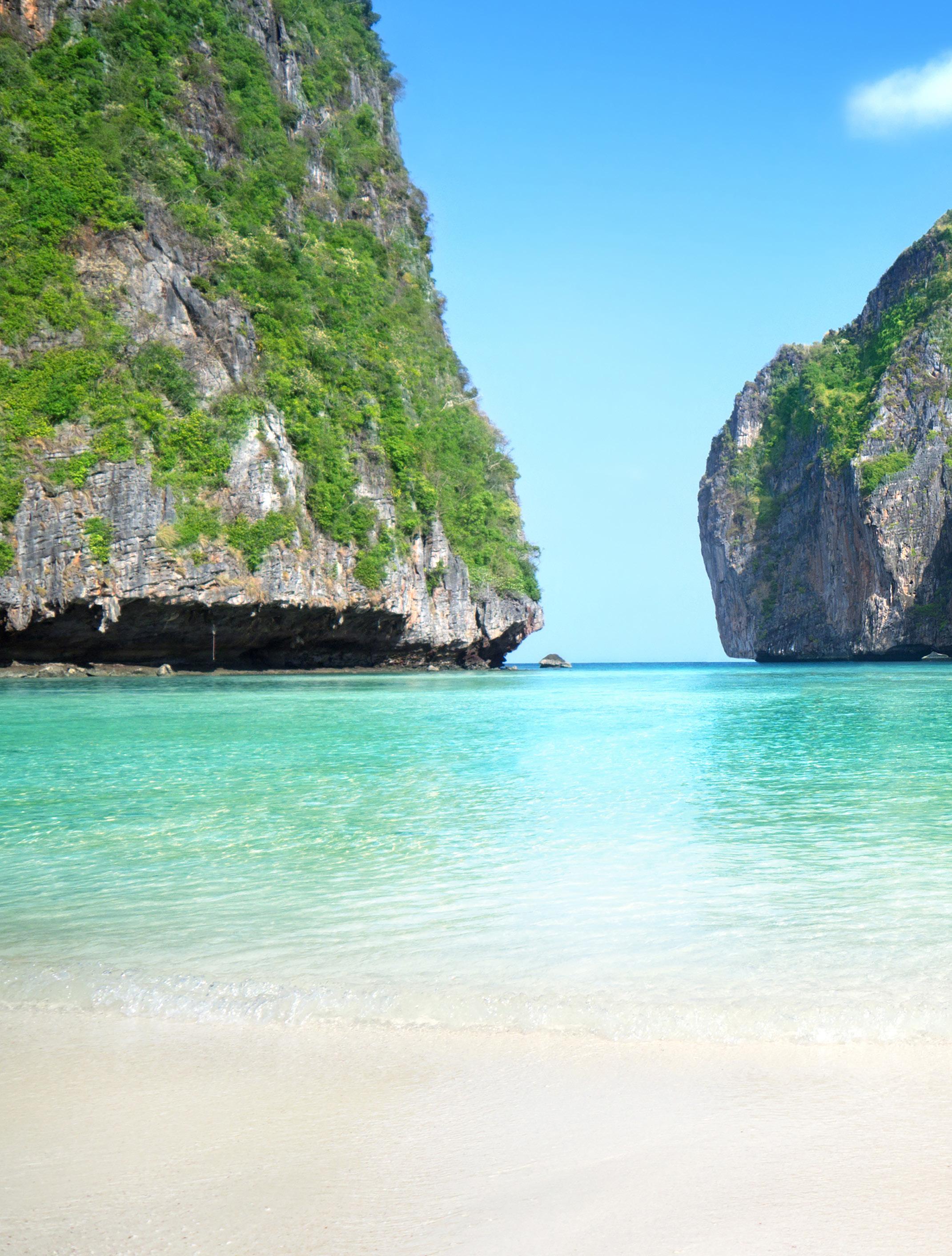
Thailand’s coastal environment and underwater world are spectacular, and tourism operators are working hard to keep them that way. By Deborah Dickson-Smith
THERE ARE OVER20 Marine National Parks in Thailand and many famous dive sites, including the Similan and Surin Islands, which are regarded by many as some of the world’s best dives. Some are only open for six months each year, minimising the impact of tourism. Here are a few ways Thailand is caring for the marine environment, and how you can help. 1. SUSTAINABLE HOTELS 2.
MAYA BAY’S REEF SHARKS
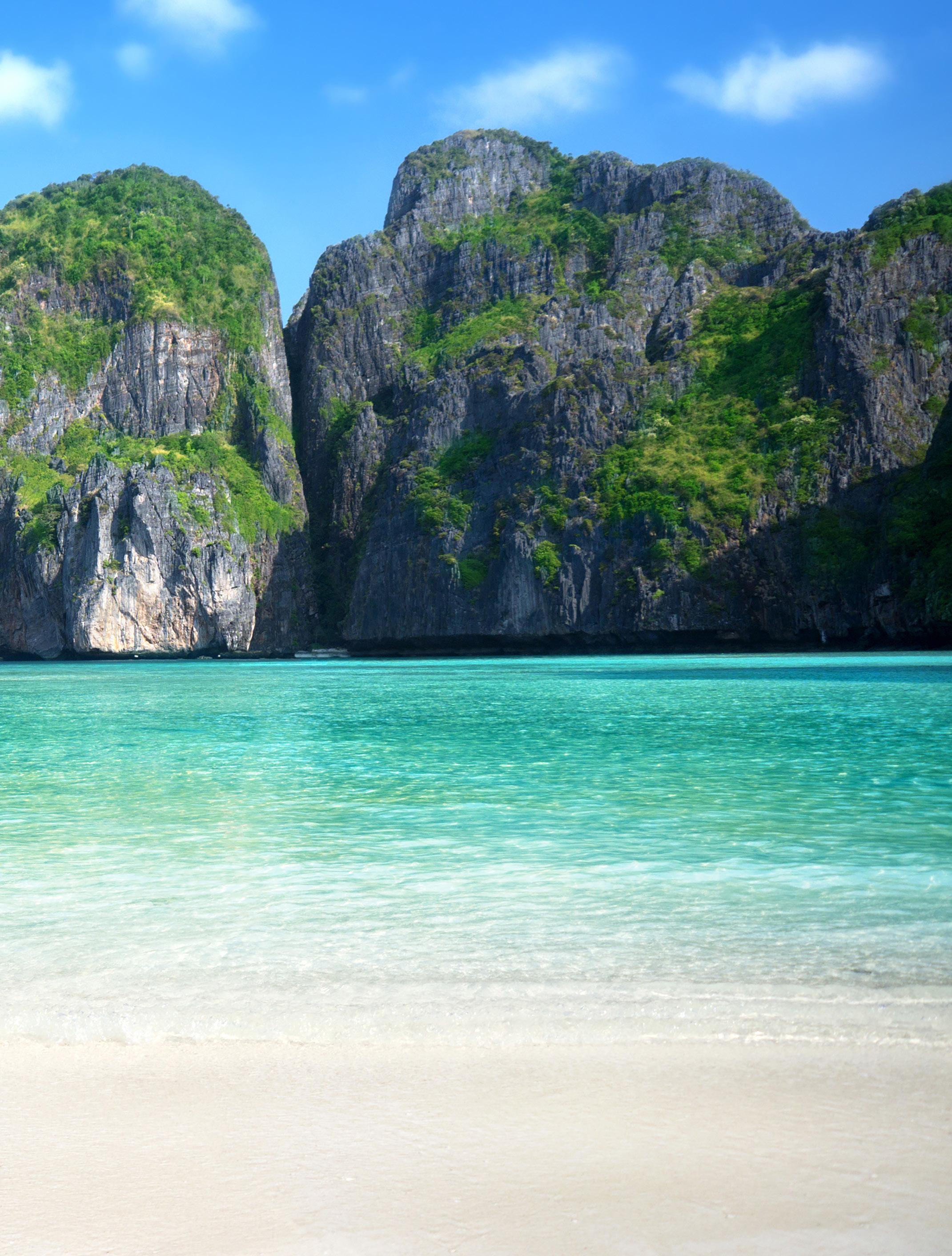
Visitors to Thailand can help protect our oceans by choosing a hotel with a strong stance on sustainability, and those that support conservation projects like the Mai Khao Marine Turtle Foundation, such as JW Marriott Phuket Resort & Spa, Marriott Vacation Club properties, Anantara Hotels Resorts & Spas and the AKARYN Hotel Group. The health of marine habitat along the Andaman Coast has significantly improved in recent years, most notably with the closure of the former tourist hot spots of Maya Bay, Koh Tachai and Koh Yoong. Divers have been delighted to discover that Maya Bay is now home to well over 100 black-tip reef sharks, the highest localised shark population in Thailand.
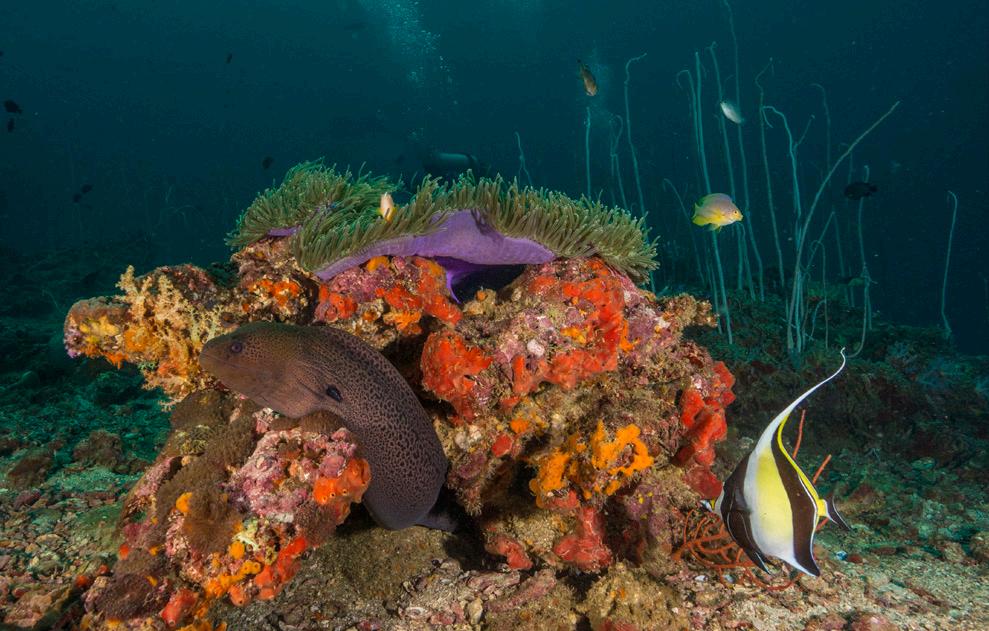
PREVIOUS SPREAD: Maya Beach © Shutterstock/Iakov Kalinin LEFT: Andaman Sea’s reefs © Pete McGee BELOW: Nesting leatherbacks © Shutterstock/ Stephanie Rousseau OPPOSITE, FROM TOP: Aleenta Resort’s organic kitchen garden; the same resort’s Pool Villa
WATCH
a video playlist of Thailand’s best diving.
3. CORAL RESTORATION 4. BEACH CLEAN-UPS 5. 6.
SUNSCREEN MONITORING
In 2010, AKARYN Hotel Group’s Pure Blue Foundation funded the construction of an artificial reef in Phang Nga to revive a reef system destroyed by the now-defunct tin mining industry. Similar projects are similarly in place in Phuket and Koh Samui, with support from other hotels and resorts. The Biodiversity Finance Initiative is one of several organisations supporting beach clean-ups, repurposing Koh Tao’s unemployed boat operators to clean up the island. Similar initiatives are being managed by resorts along the coast on both sides of the Thai peninsula. The Thai Government has banned sunscreens that contain coral-damaging chemicals (oxybenzone, octinoxate, 4-methylbenzylidene camphor or butylparaben) from all of its marine parks. Anyone found using these sunscreens can be fined 100,000 baht (approximately AU$4,192).
LEATHERBACK TURTLES RETURN
Through the efforts of locals organising regular beach cleanups, and efforts to minimise light pollution, rare leatherback turtles have returned to the beaches to lay their eggs. Dr Kongkiat Kittiwatanawong, the director of the Phuket Marine Biological Center, said this is the greatest number of leatherback sea turtle nests that Thailand’s beaches have seen in 20 years.
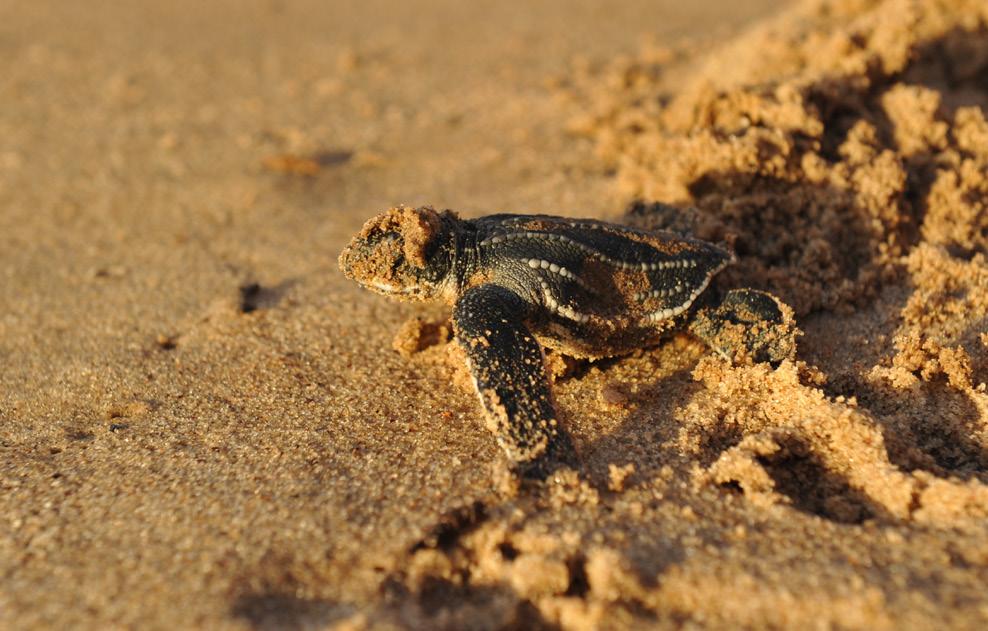
INTERVIEW
Sustainable state of mind

What does it mean to be a sustainable tourism business? AKARYN Hotel Group Founder Anchalika Kijkanakorn chats about the company’s long-term plan. By Deborah Dickson-Smith
OPERATING SUSTAINABLY encompasses a broad range of initiatives, each designed to lower your carbon footprint and protect the environment. It is a concept that has underpinned the development of the AKARYN Hotel Group, which manages small luxury resorts throughout Southeast Asia.
According to founder Anchalika Kijkanakorn: “Our underlying DNA is to leave the smallest footprint, whether that’s ditching singleuse plastic or improving our energy efficiency.”
AKARYN was the first hotel group in Thailand to get rid of single-use plastic and has since invested in solar panels at its Phuket Resort Aleenta.
“We’ve also started to use food waste in our gardening. We have started a farmers’ market in one of our hotels, so our guests can purchase local produce, and the produce used in our kitchens is from local farms. My next project will be working with the local community to teach them alternative crafts, starting with how to make soap to use in the hotels.
“To truly operate sustainably, you need to think long term. When I started this hotel, at the same time, I started the Pure Blue Foundation.
“The foundation works with the local community to try to instil a love of the natural environment that we earn a living from. We hold regular beach clean-ups and reward volunteers with a beach party and barbecue dinner.”
